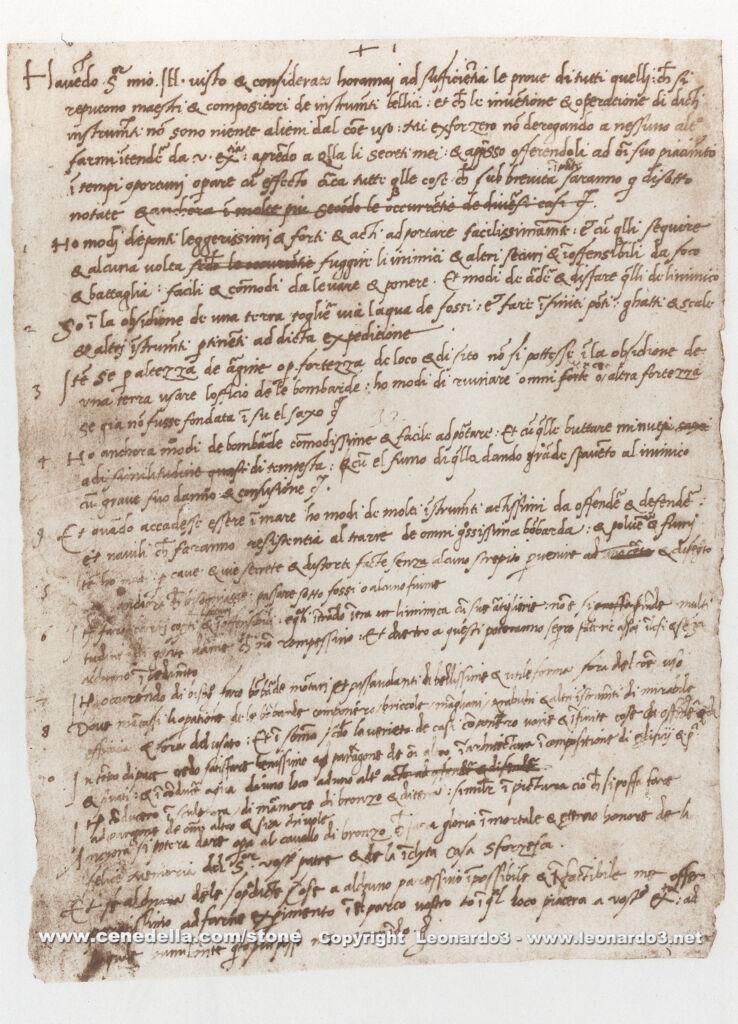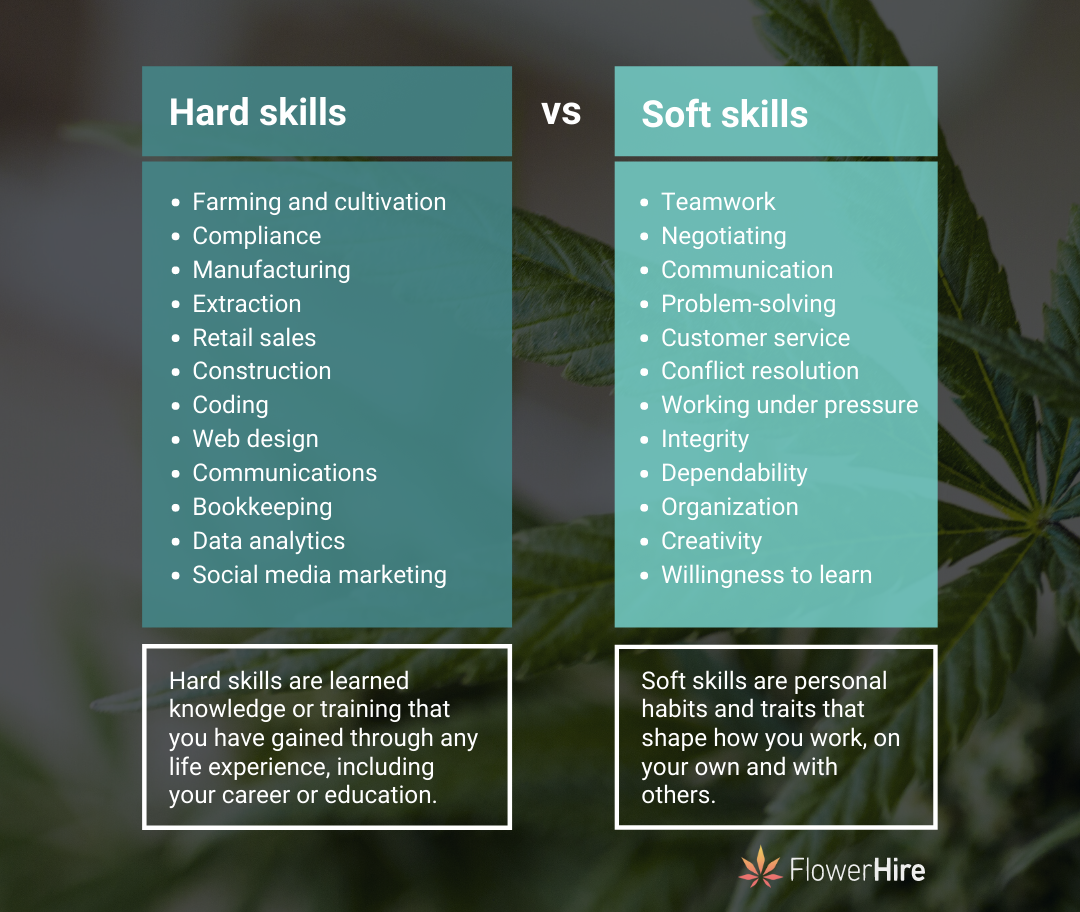If you’re writing a resume for a cannabis company just like you would for a non-cannabis company, you’ll have a hard time standing out. Job seekers, who struggle to get noticed among their competition frequently ask us “How do I showcase my skills for the cannabis industry?” Or, in other words, “How do I write a cannabis resume?”
Perhaps the ancient Mesopotamians in 3200 BC were as bad at backing up their files as many of us are today… But the earliest historical records suggest that the first resume was created by Leondardo Di Vinci in 1482 (1). Today, you could say it’s an outdated form of “technology.” (This is exactly why we partnered with engin sciences to launch a specialized career portal that equips both companies and job candidates with the tools and insights necessary to build a robust, quality workforce. Job seekers, check out our job search platform Careers in Cannabis to create your engin profile and apply to jobs in one click).
But despite their ancient nature, resumes are still essential for finding your dream job in any industry. And in the cannabis industry, a carefully considered cannabis resume is what’s going to make you stand out among the hundreds of other job applicants knocking on the doors of employers.
Up to this point, many members of the cannabis industry have gotten by without a solid cannabis resume. In the legacy industry practices, it was common for employees to get hired sheerly based on a cultural fit and spoken word that the individual had the required skills. But in today’s legal industry, more companies want a documented account of measured success and accomplishments. And many companies utilize key performance indicators to quantifiably measure performance over time for specific objectives.
So how can you make your cannabis resume the most impactful? We’ve put together this guide so you can stand out among other cannabis job applicants.

How to write a cannabis industry resume that attracts employers to you
Before you dive into writing a cannabis resume, make sure you have the personal characteristics best suited for the industry. Understanding The DNA of a Good Cannabis Hire will help you:
- Know if you’re a good fit for the cannabis industry
- Present yourself well to employers
In our blog article, The DNA of a Good Cannabis Hire, FlowerHire’s CEO David Belsky outlines the four foundational qualities of every good cannabis hire. When job seekers come to FlowerHire recruiters, these are the first four things we always look for – before checking any hard skills. Go check it out to see where you stand.
If you said yes to all four, then move on to the points below for writing your cannabis resume. (And if you’re only looking for how to describe your cannabis work experience, skip to about halfway down this page)
1 Do your research on the cannabis company you want to work with

In the cannabis industry, there’s a huge focus on culture (as you probably realized if you checked out The DNA of a Good Cannabis Hire). And while there’s certainly a culture to the industry as a whole, each company has its own unique culture and employer brand. Before applying to a company, seek out ways to understand their specific culture. And present yourself in a way that shows you are indeed a cultural fit. To find more information about a company’s culture:
- Scour their website
- Read their mission statement and understand their “why”
- Follow their social media accounts
- Follow employees who are active in industry discussions
- Sign up for the email newsletter, podcasts, etc.
2 Match the language on your cannabis resume to the employer’s job description
Different companies sometimes have different job titles for the same role. For example, the Director of Human Resources may also be titled (naming only a few):
- HR Director
- Director of Talent Acquisition
- Director of Talent Management
- Employer Brand Director
Within these job descriptions may come noteworthy nuances in the responsibilities and goals for the role. Pay close attention to these differences. These unique differences may well be critical in your assessment of whether or not the open role, the company, and you are a good fit. Observe how the subtleties differ from company to company. And alter the wording of your resume to speak to the specific nuances of the company you’re applying to. In a sea of job applications, it’s these small differences that make you stand out.
A few more things to note on language:
- Avoid clichés and jargon
- Use action verbs
- Keep it in the third person
- Use past tense for past positions
- Use present tense for current position

3 Sculpt your summary
The summary is 2-5 sentences that highlight the skills and qualities that make you the best fit for the role. It’s the spot where you have an opportunity to connect your personality and mindset to your skillset. Similar to how you go to a company’s mission statement to see their “why,” your summary is where the company will go to see your “why.”
Tip: It may be helpful to write your summary last. Why you’re the best fit for the role may become more clear to you as you go through your previous work history and pick out which skills are the most applicable.
4 Format for your cannabis resume for quick skimming
It’s common for one cannabis job to have over 300 applications. And, understandably, a hiring manager may only have the bandwidth to look at your resume for only one or two seconds before deciding to short-list it, or “file” it. If your cannabis resume looks like a big chunk of text, then no key information will quickly stand out, and your resume will get tossed. Make it stand out by intentionally formatting it for the reader who scans. Make sure you use:
- 1-2 pages long for brevity
- 10.5-12 size font for readability
- Headings to separate sections
- Bullet points to highlight skills
- Short, concise sentences for clarity
- Use bold and italics type carefully for emphasis
- Avoid underlines except for indicating web links
- Consistent punctuation (choose yes or no to periods at the end of bullet points)

5 Work history
This is where you want to highlight your skills. There may not be space on your resume for all of the skills you’ve developed… so it’s critical to highlight what’s the most applicable to the role you’re applying to. Employers want to see which skills will make you successful in their company in the role they’re hiring for.
Remember that like so many applicants, you may not yet have any direct cannabis industry experience to report. But also remember, that you have to connect the dots for your employers. Employers are skimming resumes, fast. They’re not going to stop and think about how a skill can be transferred to the cannabis industry. You need to think about how your skills transfer to the cannabis industry. And write your cannabis resume in a way that emphasizes transferability.
Hard skills vs soft skills

Hard skills. Hard skills are your learned abilities that are acquired and enhanced through practice, repetition, and education (3). These skills are often learned via training and education. They can typically be applied to multiple industries. A few examples of hard skills are:
- Coding
- Web design
- Communications
- Bookkeeping
- Data analytics
- Social media marketing
- Farming and cultivation
Whenever possible, provide numbers and metrics for how your hard skills impacted the company. For example, “Once x was implemented, x increased by x%”.

Soft skills. In recent years, employers have had a stronger focus on soft skills than in the past. Soft skills are essential for working with other people and have a positive impact on both the company you’re working for and furthering your own career. In the cannabis industry which requires quick-thinking and innovation, soft skills are just as important as hard skills. A few examples of soft skills are:
- Teamwork
- Negotiating
- Communication
- Problem-solving
- Customer service
- Conflict resolution
- Working under pressure
Skills like strong communication, leadership, and teamwork support you in running projects smoothly and delivering results effectively (2).
How do I show my transferable skills on my cannabis resume?
The most common resume format is chronological – you start with your most recent job experience and work your way back chronologically. However, since the goal of a cannabis resume is to highlight your transferable skills, consider restructuring your resume to a functional resume format.
A functional resume is when you put your more relevant experience first and work back to your least relevant. This will put the most relevant experience at the top, so employers see that first. If your first listed experience does not have relevance to the cannabis position you’re applying to, the employer may stop reading the rest.
If you’ve worked in a highly regulated industry, make sure to highlight it. Cannabis companies understandably value experience in food and beverage, consumer packaged goods (CPG), and alcohol are just a few.
How to talk about unregulated/legacy cannabis experience on your cannabis resume
If you have unregulated/legacy cannabis work experience that’s related to the job you’re applying to, you should include it on your resume. Please carefully consider how you present this information, by talking about the knowledge and skills you gained and how it transfers to your future role.
For example, if you ran a grow operation, you might talk about what you learned about cultivation, growing different strains, and how you’re excited to bring your knowledge to the regulated market. If you were selling product, you might describe how you recommended different strains based on consumer or patient preferences, symptoms, and how you helped patients find products that provided the relief they were seeking.
We want to honor the experience you may have curated in the unregulated/legacy market. This information intends to avert associations of criminality, instead focusing on an understanding of the breadth of skills you could bring to your role.
Education
The education section of your cannabis resume may look very similar to any resume you’ve already created. You list the institution, degree, and certificates you earned. Emphasize any details of your education that might be of special interest to the company you’re applying to. There’s no need to list the years unless you’re a recent graduate. As professionals progress through their careers, work experience becomes more important than education. So depending on where you are in your career, you may choose to put your work experience ahead of your education.
Any cannabis-related study or in-field experience – while not required – is a huge bonus. If you want to get ahead with cannabis education, check out Green Flower Media. Green Flower offers certificates in a variety of different cannabis industry fields.

How to write about your cannabis work experience on your resume
We’ve just discussed how to write a cannabis resume at a high level. Now, we’re going into more detail on how to write about your cannabis work experience on your resume.
When writing about your previous work experience, how do you:
- Professionally highlight the company you worked at?
- Accurately represent your skills and accomplishments?
- Talk about your cannabis job experience on your resume?
A problem with writing a more traditional resume style for cannabis is that traditional resumes don’t talk about the company – aside from a few high-level details. The traditional resume focuses primarily on the skills of the individual. This is fine for non-cannabis companies because the potential employer can still paint a picture of what your previous role was like.
But the cannabis industry is different. The legal cannabis industry is so new, and there are so many different types of organizations within the cannabis industry. To tell a future employer that you worked as X at a cannabis company does not say enough about what you did. Your next employer will have a hard time painting the picture of what the company was actually like. This is why we suggest adding more details about the company on your cannabis resume. So you can represent yourself as accurately as possible to your next employer.

How to describe cannabis work experience
There are many types of business models within plant-touching and ancillary (4). Then there are multi-state operating businesses and vertically integrated. Your title at one type of cannabis company might look drastically different than at another cannabis company. So be sure to include a description of the cannabis company so your employer understands what the company looked like.
1 Write the name of the cannabis business
The description should start with the legal name of the business. But if there is a very common retail facing or consumer name, then they should choose that name over the legal name.
Why?
Often in cannabis, one company owns many different brands. Your employer may be well-known as the brand name, but your paycheck doesn’t say that name. Write whatever name the company is the most well-known as.
2 Describe the cannabis business
Next, include a one to two-sentence description of that company. What are the retail brands? What are CPG brands? Is there a brand for the flower? This is how your future employer will understand more about your responsibilities.
Your description should look something like this:
[Cannabis company] is a vertically integrated, legally licensed operator in Michigan. With 8 retail stores, 5 cultivation facilities, with 7 in-house brands, representing over 100 SKUs.
Or
[Cannabis company] is a licensed multi-state operating company operating in these 6 states: [list the states]. It has 15 retail locations, and 13000 square feet of cannabis cultivation across 5 different facilities.
Why?
Two reasons we need to describe the business:
- Every cannabis company is different, some are vertical, some a just retail, some are in different states, and some an ancillary.
- And it professionalizes the experience at the company. It makes the cannabis industry relatable to people who maybe have never worked in the industry before or who may be less familiar.

3 Choose bullet points to describe your role
Often, if you work in cannabis, you wear multiple hats. Your role straddles multiple lanes. How do you break that down into a job description? Think about the different tasks you did that brought value to the business. Those are what we’ll highlight on your cannabis resume.
Accomplishments: What are the 3-4 things you’re the proudest of from your role?
Day-to-day: What were 10-15 things that were a part of your day-to-day, or tasks that you had to focus on at least every week. What were those things?
Problem-solving: Include anything you created for the business that:
- Solved a problem
- Created an efficiency
Numbers: Anything you can attach a number to should be included. For example: “I implemented X which enabled us to cut costs by X.”
Here’s a list of questions to help you brainstorm some key bullet points to include on your resume:
- What key performance indicators KPIs did you reach?
- What was the average ticket size?
- How many people have you hired?
- How many customers did you serve?
- What type of leadership responsibility?
- How many employees did you manage?
- Any type of technology you worked with?
- Did you interface with other departments?
- What type of new employee training did you do?
- Systems that you used, created, or implemented?
- Did you have budgeting you need to be mindful of?
- Were you a part of rolling out a new sales software?
- What processes were a part of your day-to-day?
- Who did you report to? The 3 partners, the president, retail GM?
- What types of roles were you involved in the interview process?
- What type of 3rd party vendors did you manage a relationship with?
- Was there related to compliance that you needed to be considerate of?
- Were you able to work within a budget to deliver branded products on time?

Has your cannabis resume been completed and now you’re on the job hunt?
Check out the cannabis jobs on Careers in Cannabis and upload your resume.
Check out these blog posts:
- How to Find Your New Job in the Cannabis Industry
- How to Find Work in the Cannabis Industry That Fits You
Reach out to a FlowerHire cannabis recruiter to find a new cannabis job at a company that matches your values.

Need more support on how to write a cannabis resume?
The Canna Career Partners are cannabis industry resume experts. Reach out to them if:
- Writing a resume for the cannabis industry is in any way overwhelming
- You want a resume that stands out and gives you an edge
Dana Leavy from Canna Career Partners spoke at our Careers in Cannabis Virtual Talent Conference in January of 2021.
Watch Dana Leavy’s presentation on How to Write a Great Cannabis Resume
Resources
- https://www.businessinsider.com/how-resumes-have-evolved-since-their-first-creation-in-1482-2011-2
- https://www.mbopartners.com/blog/how-manage-small-business/why-are-soft-skills-important/
- https://www.indeed.com/career-advice/resumes-cover-letters/hard-skills-vs-soft-skills
- https://www.leafly.com/news/industry/cannabis-business-models-101


